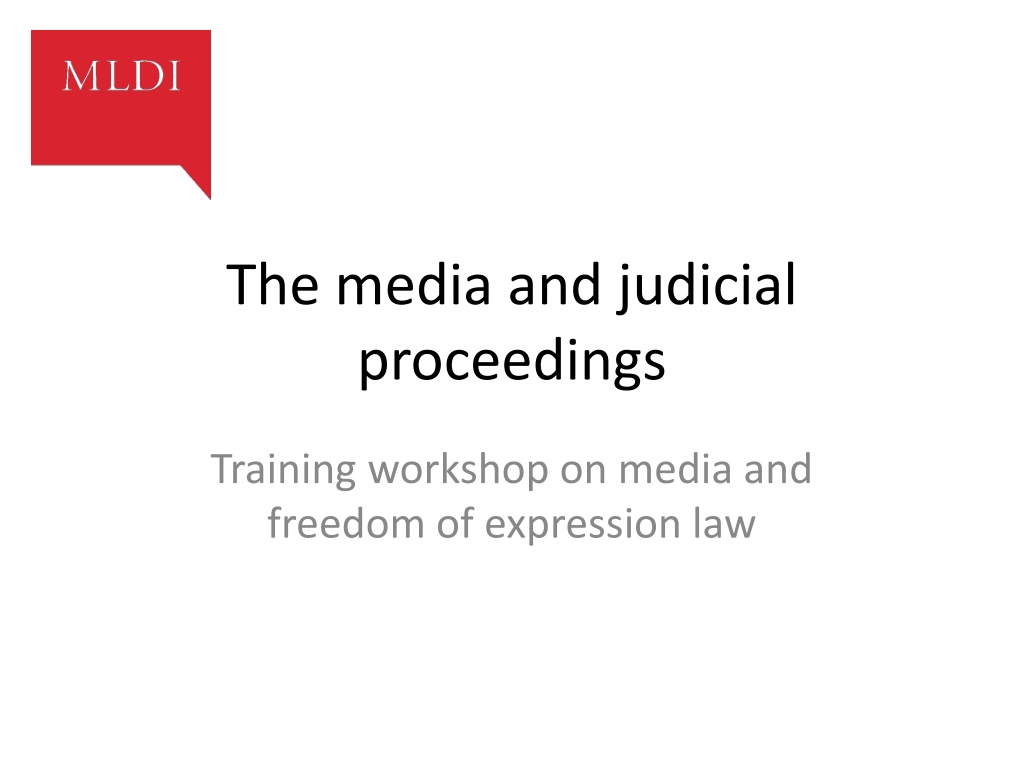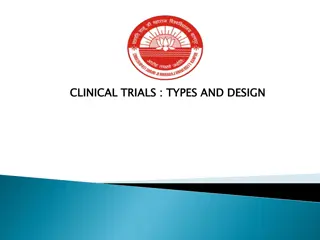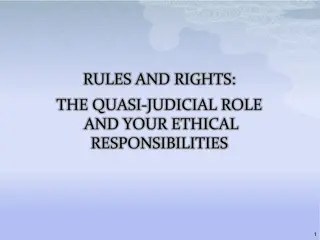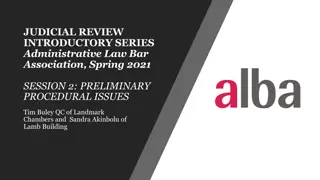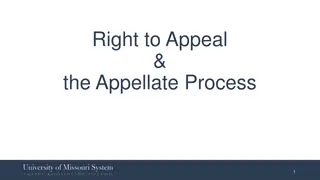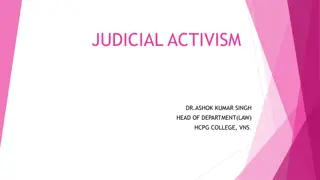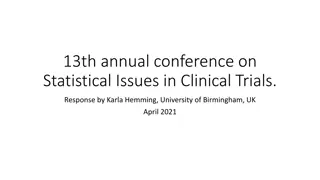Importance of Media in Judicial Proceedings: Safeguarding Fair Trials
Media plays a crucial role in ensuring the right to a fair trial by providing transparency, scrutiny, and accountability in judicial proceedings. Open justice, supported by media coverage, helps prevent miscarriages of justice and upholds fairness in legal processes. While media freedom is essential, potential issues like jeopardizing investigations and trial by media must be carefully considered to maintain the integrity of the judicial system.
Download Presentation

Please find below an Image/Link to download the presentation.
The content on the website is provided AS IS for your information and personal use only. It may not be sold, licensed, or shared on other websites without obtaining consent from the author. Download presentation by click this link. If you encounter any issues during the download, it is possible that the publisher has removed the file from their server.
E N D
Presentation Transcript
The media and judicial proceedings Training workshop on media and freedom of expression law
Question for discussion Why is the media an important part of the right to a fair trial?
Media freedom is sometimes limited for the purposes of the fair administration of justice. But it is important to remember that open justice has always been regarded as an essential guarantee of fairness ( justice must be seen to be done ).
This is why the media were allowed to broadcast the trials of celebrity defendants such as O.J. Simpson and Oscar Pistorius. A responsible press has always been regarded as the handmaiden of effective judicial administration, particularly in the criminal field. Its function in this regard is documented by an impressive record of service over several centuries. The press does not simply publish information about trials but guards against the miscarriage of justice by subjecting the police, prosecutors, and judicial process to extensive public scrutiny and criticism. (US Supreme Court, Sheppard v. Maxwell)
From the right to open justice flows the media's right to gain access to, observe and report on, the administration of justice and the right to have access to papers and written arguments which are an integral part of court proceedings subject to such limitations as may be warranted on a case-by-case basis in order to ensure a fair trial. (South African Constitutional Court, Independent Newspapers v. Minister for Intelligence Services)
But can you see any potential problems with open reporting of all stages of judicial proceedings?
These concerns are often mentioned: Jeopardizing continuing investigations Trial by media Interfering with the privacy of participants Undermining the authority of judges
Reporting investigations There should be a presumption of openness: Under certain conditions, public access to confidential or sensitive information related to court proceedings will endanger and not protect the integrity of our system of justice. Public access will be barred only when the appropriate court concludes that disclosure would subvert the ends of justice or unduly impair its proper administration. (Canadian Supreme Court, Toronto Star Newspapers Ltd. v. Ontario)
There is a danger of information about an investigation being selectively leaked. When judicial authorities and police services themselves have decided to provide information to the media in the context of on-going criminal proceedings, such information should be provided on a non-discriminatory basis. (Council of Europe, Committee of Ministers)
Reporting trials Public trials are a duty upon the State that is not dependent on any request, by the interested party, that the hearing be held in public. (Human Rights Committee)
However The press and the public may be excluded from all or part of a trial for reasons of morals, public order (ordre public) or national security in a democratic society, or when the interest of the private lives of the parties so requires, or to the extent strictly necessary in the opinion of the court in special circumstances where publicity would prejudice the interests of justice. (Art. 14 ICCPR)
Trial by media How can media report trials without prejudicing them? Provided that it does not overstep the bounds imposed in the interests of the proper administration of justice, reporting, including comment, on court proceedings contributes to their publicity and is thus perfectly consonant with the requirement that hearings be public. Not only do the media have the task of imparting such information and ideas: the public also has a right to receive them. (Worm v. Austria)
How the media reports court proceedings will also be affected by considerations such as: Greater latitude in the case of proceedings involving politicians and other public figures Public interest in the matter of the proceedings
Question for discussion Does the balance of how far the media may comment on a court case vary depending on whether the case is to be decided by members of the public (a jury) or a trained legal professional (a judge)?
Privacy of participants Some of those taking part in court proceedings are (or should be protected) for example, children and victims of sexual crimes. Courts are entitled to impose reporting restrictions in such instances.
Questions for discussion What about the privacy of witnesses? Or defendants?
Criticism of judges Courts have distinguished scurrilous abuse from healthy comment and criticism of judges (Kenyan High Court, Republic v. Nowrojee). The Federal Court of Australia has noted: [I]t is no contempt of court to criticize court decisions when the criticism is fair and not distorted by malice and the basis of the criticism is accurately stated. To the contrary, a public comment fairly made on judicial conduct that is truly disreputable (in the sense that it would impair the confidence of the public in the competence or integrity of the court) is for the public benefit. (Nationwide News Pty Ltd v. Wills)
Expressing an opinion on a court decision should not be punished: Looked at against the background of the case, the accusations in question amount to an opinion, whose truth, by definition, is not susceptible of proof. Such an opinion may, however, be excessive, in particular in the absence of any factual basis, but it was not so in this instance. (ECtHR, De Haes and Gijsels v. Belgium)
